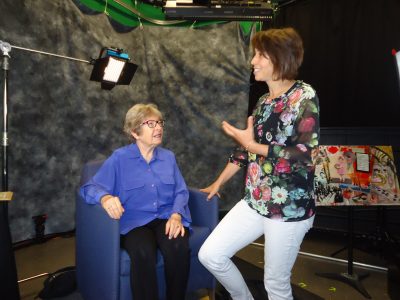Ottawa-born documentary director Koa Padolsky is working with the Centre for Holocaust Education and Scholarship (CHES) to record the testimonies of local Holocaust survivors for a series of video documentaries.
CHES, part of the Max and Tessie Zelikovitz Centre for Jewish Studies at Carleton University, will make the videos available on its website where they will be accessible for educational purposes.
CHES Director Mina Cohn said it was important to make these videos because so many survivors are aging and soon won’t be able to tell their stories in person.

Kati Morrison
“The personal accounts unite the experience in a very powerful way, so we decided that now is the time to see if we can help preserve some of the testimonies of the local survivors,” Cohn said.
While some of the survivors being filmed have given recorded testimony before, they were recorded on old technology, she said, so there was a greater sense of immediacy to preserve their stories.
Padolsky, who now lives in the United Kingdom, was in Ottawa on July 28 and 29 to record the testimonies of 10 survivors.
Padolsky’s latest film, “Le Chemin des Juifs,” chronicles the story of Holocaust survivor and Ottawa resident David Shentow’s experiences during the war.
Cohn met Padolsky when she attended a private screening of “Les Chemin des Juifs” in April. The feature length film is directed by Daniel Bhattacharya and co-produced / executive produced by Koa Padolsky. Impressed with the film, Cohn approached Padolsky after the screening and spoke to her about recording the series of video interviews with Ottawa Holocaust survivors.”
“I was absolutely honoured to have been asked to direct this project,” Padolsky said. “To be able to tell all of these important stories is an extraordinary privilege.”
Each of the 30-minute videos covers the main aspects of the survivors’ stories and experiences, with segments on pre-war life, Nazi invasion, wartime experiences, post-war life, and the importance of remembrance.
Cohn and Padolsky hope that, through this project, the survivors’ stories will resonate with the next generation and their memories will be preserved for years to come.
“For audiences, it’s the opportunity to have that first-person account so they can learn [about the Holocaust]. It’s that personal account that means everything; it makes the history real,” Padolsky said.
Those sentiments were echoed by Kati Morrison, one of the Holocaust survivors whose testimony was recorded.
“The emotional impact from listening to a person [talk about their experiences] is so different than what you get from just reading about it in a textbook,” Morrison said.
Morrison, who was born in Budapest, Hungary, and survived the Holocaust with the help of her grandmother, speaks at schools to educate young people on the Holocaust and to teach them “what prejudice, racism and hatred can do.” She said the CHES project is a natural extension of her work.
Raul Korengold, another Holocaust survivor who took part in the project, feels the work CHES is doing to ensure the memories of survivors will never be lost is important.
Korengold was born in Strasbourg, France, in 1936 and fled Nazi persecution with the help of gentiles who risked their lives to protect him and his family. He hopes that, through the efforts of those who gave their testimony, the horrors of the Holocaust, where “mass murder was state enterprise,” will never fade with time.
By: Michael Aarenau
Source: Ottawa Jewish Bulletin